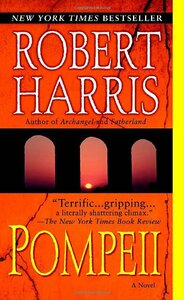You need to sign in or sign up before continuing.
Take a photo of a barcode or cover
adventurous
tense
Plot or Character Driven:
A mix
Harris' story about the Mt. Vesuvius eruption through the eyes of the Aquarius is educational and gritty, but it's a slog to get through. A solid ending, though.
This was a hard book to put down. It takes place during the three days preceding the eruption of Mt. Vesuvius in 79 A.D. The level of research that obviously went into this book is incredible. One of my favorite parts of the book were the snippets at the beginning of each chapter from books on volcanology, explaining in very scientific detail the likely events occurring beneath the mountain leading up to the eruption.
I really liked the main character, aqueduct engineer, Marcus Attilius. An honorable man of integrity and drive, he was easy to get to know, and even easier to root for. His love interest, Corelia, is worth mentioning, but there isn't much time to get to know her.
I really appreciated the level of detail in describing the culture and depravity of the city of Pompeii. Some of the details made me very uncomfortable, but it definitely reflects the reality of Roman society at the time. The evil present in the city and society at large was heinous, and Harris portrays it as such. There is no room for sympathy toward the villains of the story. Frankly, I like that. Evil is evil, and good is good.
I also loved Pliny - I've never known much about him, and now I am intrigued about this historical figure. I think I would like to search out a biography of the man who so dearly loved nature and science.
As for some of the other characters, while their development wasn't incredibly deep, Harris manages to elicit feelings about each one. Some of them you pity and despise at the same time. Others you wish to know better. The volcano keeps that from happening, though. And the end leaves you feeling the way such a tragedy would. It feels a little bit as though so many lives were left unfinished, but I was satisfied with such an ending.
You are kind of left with the shock of the aftermath, unsure what to think, but hoping for the best for the few survivors in Pompeii.
I really liked the main character, aqueduct engineer, Marcus Attilius. An honorable man of integrity and drive, he was easy to get to know, and even easier to root for. His love interest, Corelia, is worth mentioning, but there isn't much time to get to know her.
I really appreciated the level of detail in describing the culture and depravity of the city of Pompeii. Some of the details made me very uncomfortable, but it definitely reflects the reality of Roman society at the time. The evil present in the city and society at large was heinous, and Harris portrays it as such. There is no room for sympathy toward the villains of the story. Frankly, I like that. Evil is evil, and good is good.
I also loved Pliny - I've never known much about him, and now I am intrigued about this historical figure. I think I would like to search out a biography of the man who so dearly loved nature and science.
As for some of the other characters, while their development wasn't incredibly deep, Harris manages to elicit feelings about each one. Some of them you pity and despise at the same time. Others you wish to know better. The volcano keeps that from happening, though. And the end leaves you feeling the way such a tragedy would. It feels a little bit as though so many lives were left unfinished, but I was satisfied with such an ending.
You are kind of left with the shock of the aftermath, unsure what to think, but hoping for the best for the few survivors in Pompeii.
Pompeii, late August, 79 A.D. …One of the world’s most famous volcanic eruptions is about to unfold, and you are there to witness it through the eyes of Marcus Attilius, a Roman aqueduct engineer sent to the coastal town of Misenus to investigate why there is a sudden drop in the town’s aquifer. Robert Harris’s tale is historically accurate, weaving the lives of the aristocratic Romans with Attilius’s attempt to find the cause of the water shortage. Power struggles, the decadent lifestyles of the Roman elite, betrayals, and ultimately the triumph of love are all overshadowed by the imminent eruption of Mt. Vesuvius.
I’ve loved anything to do with volcanoes since I was eight years old. The history of how Vesuvius’s eruption in 79 A.D. encased the hapless citizens of Pompeii and Herculaneum in pumice ash and preserved them for posterity has always fascinated me. This novel, for the first time, places a “personal face” of one who lives with the doomed denizens of that coastal region for several days prior to the eruption. Even more fascinating is Attilius’s involvement with Pliny the Elder, whose historical observations of the eruption were written down and preserved by his nephew, Pliny the Younger.
This was a remarkable and utterly enjoyable novel, and I highly recommend it to any lovers of historical fiction.
I’ve loved anything to do with volcanoes since I was eight years old. The history of how Vesuvius’s eruption in 79 A.D. encased the hapless citizens of Pompeii and Herculaneum in pumice ash and preserved them for posterity has always fascinated me. This novel, for the first time, places a “personal face” of one who lives with the doomed denizens of that coastal region for several days prior to the eruption. Even more fascinating is Attilius’s involvement with Pliny the Elder, whose historical observations of the eruption were written down and preserved by his nephew, Pliny the Younger.
This was a remarkable and utterly enjoyable novel, and I highly recommend it to any lovers of historical fiction.
I love this book so much! Once I started reading this. There was no stopping me. Part of it was because I was so in love with Pompeii. I never been to Pompeii, but I love to go there sometime.
Historical Fiction. Day in the life of a few people who might have been present for the eruption. Spattered with a few sourced facts. The story really pulls you in and feels real.
adventurous
funny
lighthearted
tense
fast-paced
Plot or Character Driven:
Plot
Strong character development:
No
Loveable characters:
Yes
Diverse cast of characters:
N/A
Flaws of characters a main focus:
No
Very well written.
The plot was a drag at times, at least for us who are not engrossed in the topic of geology, but of course it was part of the plot. The writing kept me reading, however. There was effort, description, and I appreciate it.
This is the first novel by Robert Harris I've read. And some of the passages...what can I say, they were just so eloquent?
"Men mistook measurement for understanding. And they always had to put themselves at the center of everything. That was their greatest conceit. The earth is becoming warmer—it must be our fault! The mountain is destroying us—we have not propitiated the gods! It rains too much, it rains too little—a comfort to think that these things are somehow connected to our behavior, that if only we lived a little better, a little more frugally, our virtue would be rewarded. But here was nature, sweeping toward him—unknowable, all-conquering, indifferent—and he saw in her fires the futility of human pretensions. "
The ending somewhat surprised me.
The plot was a drag at times, at least for us who are not engrossed in the topic of geology, but of course it was part of the plot. The writing kept me reading, however. There was effort, description, and I appreciate it.
This is the first novel by Robert Harris I've read. And some of the passages...what can I say, they were just so eloquent?
"Men mistook measurement for understanding. And they always had to put themselves at the center of everything. That was their greatest conceit. The earth is becoming warmer—it must be our fault! The mountain is destroying us—we have not propitiated the gods! It rains too much, it rains too little—a comfort to think that these things are somehow connected to our behavior, that if only we lived a little better, a little more frugally, our virtue would be rewarded. But here was nature, sweeping toward him—unknowable, all-conquering, indifferent—and he saw in her fires the futility of human pretensions. "
The ending somewhat surprised me.
challenging
informative
sad
medium-paced
Plot or Character Driven:
Plot
Strong character development:
No
Loveable characters:
No
Diverse cast of characters:
No
Flaws of characters a main focus:
No
adventurous
medium-paced
Plot or Character Driven:
Plot
Strong character development:
No
Loveable characters:
No
Diverse cast of characters:
Complicated
Flaws of characters a main focus:
No
adventurous
challenging
dark
emotional
tense
fast-paced
Plot or Character Driven:
A mix
Strong character development:
Yes
Diverse cast of characters:
No
Flaws of characters a main focus:
No





